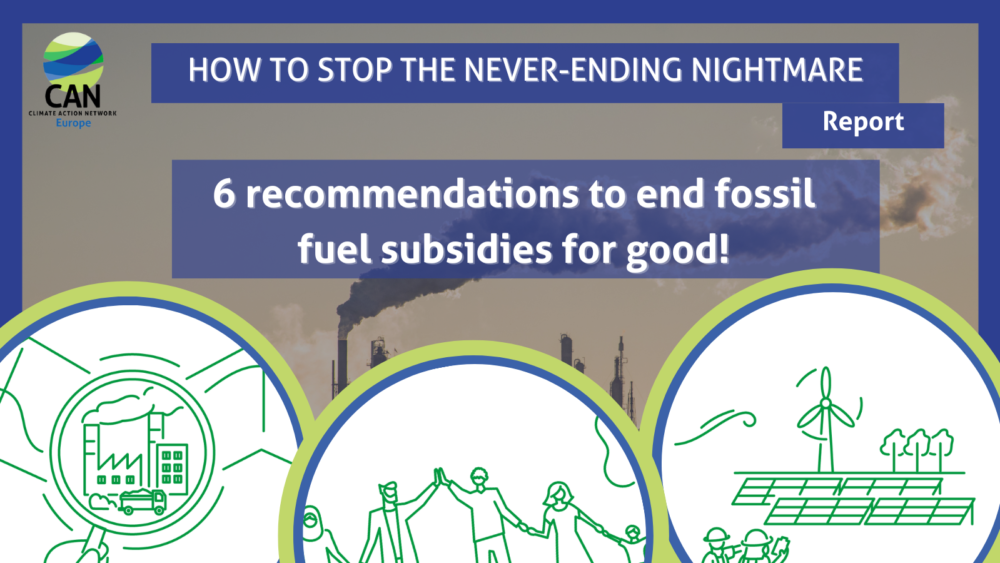-
Cross-cutting political action needed to eradicate fossil fuel subsidies and make better use of taxpayers’ money
Brussels, 31 March 2023 – A new report launched today by CAN Europe outlines how fossil fuel subsidies have infiltrated all sectors of our economy and are now pervasive, multiform and massive. The report observes how over the past years fossil fuel subsidies have been on the rise, especially since 2021 as a response to the Covid-19 pandemic and then to the war in Ukraine, directly hindering the efforts to transition to 100% renewable energy.
“Fossil fuel subsidies are pervasive, multiform and massive in Europe. Ending them will require robust and urgent action in nearly all fields, it won’t be easy but it’s possible. Last week’s IPCC report says it loud and clear: phasing out fossil fuels is key to tackle climate change, it’s just a question of political will”, said Chiara Martinelli, Director of CAN Europe.
The new report highlights new fossil fuel subsidies adopted since 2021. To cushion the economic impact of the pandemic, several Member States – for example Germany and France – included financial support to carbon-intensive industries as part of their national recovery packages, but too often failed to condition support to environmental requirements. More recently, in response to the fossil fuel crisis exacerbated by the war in Ukraine, many national governments adopted tax breaks and subsidies to protect companies and households against energy price increase. While this was necessary, these measures were often not targeted to those in need nor accompanied by flanking measures to help them engage in the energy transition.
In addition, recently adopted EU legislation opens the door again to fossil fuel subsidies for oil and gas infrastructure that would lock us in fossil fuels for many years, while gas boilers remain eligible for support in several EU funds. And while many EU institutions and Member States have been moving in the right direction to phase out international public finance for fossil fuels, there are worrying signs of backsliding from some.
CAN Europe is raising the alarm bell as fossil fuel combustion – coal, oil and gas – is by far the largest contributor to global climate change, accounting for 80 percent of greenhouse gas emissions globally. In this report, the CAN Europe network of over 180 member organisations representing 40 million people across Europe, presents recommendations to end fossil fuel subsidies in a socially just manner. Among other measures, CAN Europe urges to end subsidies benefiting the wealthiest without further delay, and to support people working in the sectors impacted in the transition. Job growth in new energy transition sectors, more than offsets a decline in traditional fossil fuel supply sectors. However, state schemes should ensure the working conditions do not deteriorate, collective bargaining should organise the transition to new jobs and the role of trade unions needs to be promoted and protected in the new green sectors.
“The hidden cost of fossil fuels for the environment, climate and public health requires urgent action in many areas, from international finance to trade, fisheries, agriculture, transport, industry, taxation, budget, finances, state aid, housing, social protection, education and skilling, and energy and climate of course. Ending fossil fuel subsidies is everyone’s business in each and every national ministry and at EU level” concluded Chiara Martinelli.
Some facts:
-
Between 2008 and 2019 EU Member States provided €55 to 58 billion per year of explicit subsidies for fossil fuels [European Commission]
-
For the aviation sector, the Energy Taxation Directive allows for a 10 year transition period during which the airlines would be paying minimal tax rates which represents a €35 billion subsidy [Transport & Environment]
-
Between 2015 and 2019, the total amount of fossil fuel subsidies grew by 4% in the EU, and fifteen Member States were still spending more on fossil-fuel subsidies than on renewable energy subsidies in 2019 [European Court of Auditors]
-
The overwhelming majority of fossil fuel finance emanates from Member States’ budgets: In 2014–16, EU funds (including EU public banks) provided approximately €2 billion fossil fuel subsidies annually, while €54 billion were provided by Member States over the same period [ODI & CAN]
-
As part of their national recovery packages, Germany is reported to have provided close to 19 bln USD unconditional subsidies to fossil fuels in 2020-2021 (as well as 11 bln conditional on achievement of certain climate targets or pollution reduction), and France more than 7 bln USD (and 20 bln conditional) [energypolicytracker.org]
-
At least 18 EU member states have cut fuel taxes, to respond to the increase of energy price following the war in Ukraine [Transport & Environment]
-
In the EU, the richest 10% of households spend 8 times more on diesel and petrol than the poorest 10% [Transport & Environment]
-
Explicit and implicit subsidies (“implicit” means the hidden cost or unpaid externalities, such as fossil fuels’ impacts on air pollution) are at about 2 percent of Europe’s GDP, which would represent $279 billion for the European Union in 2020 [IMF]
-
The IEA has tracked around USD 350 billion extra spending to reduce energy bills in 2022 in the EU [IEA]




